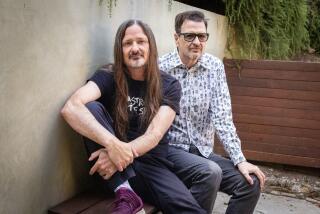Anything But Stale
- Share via
Fred Durst has many endearing qualities, but humility is not one of them.
Spend some time with the frontman for the rap-metal quintet Limp Bizkit and you’re liable get an earful about his knack for predicting what songs are going to turn into hits (“It’s just this talent I have”). Or why he and his bandmates are “geniuses in our own field.” Then there are the various movie projects he’s working on, and the record label he’s starting. All of which should, according to Durst, give a potent adrenaline jolt to pop culture’s weak pulse.
“I wanna be the Puff Daddy of rock ‘n’ roll,” says Durst, 28, while chowing down on sushi at a West Hollywood restaurant. “I wanna put great music and movies in the world. The more successful you become, the more people listen to you.”
Well, you don’t become a rock star, record producer and budding label mogul without heaps of chutzpah. But it looks as if Durst has the goods to back up his bravado.
It’s been two years since Limp Bizkit emerged from Jacksonville, Fla., with a combustible mix of wise-guy rap and tough-guy metal, a debut album called “Three Dollar Bill, Ya’ll,” and a scorched-earth campaign across the nation’s nightclubs and fairgrounds.
Then last summer Limp Bizkit--Durst, guitarist Wes Borland, bassist Sam Rivers, drummer John Otto and former House of Pain member DJ Lethal--caught a giant buzz when their buddies in Korn asked them to join the Family Values Tour, a kind of extreme music showcase that also featured the German band Rammstein and rap legend Ice Cube.
That tour, coupled with a boost from MTV, turned Limp Bizkit into crossover stars--a band where skate punks and mall rats could find common ground. The result: sales to date of 1.5 million for the debut album.
“It’s amazing what some success and TV can do for you,” Durst says. “It’s all very overwhelming. Every mall I go to, someone notices me. If I took off my red baseball cap, no one would notice me, though. But I’m addicted to my hat!”
Durst’s red Yankees cap has become his visual trademark. And even though he’s wearing it backward today, he still gets a double take from the waiter, who tells the singer how much he enjoys Limp Bizkit. With a sly smile and a handshake, Durst quietly acknowledges the compliment.
Durst can summon these flashes of boyish charm at will. For a guy who likes to flush himself down a giant toilet on stage, Durst is disarmingly gentle face to face. Even if all he wants to do is talk up his various projects.
And right now, Durst’s docket is full. In addition to producing an album by the band Cold, he’s also overseeing the final mix on Limp Bizkit’s second release, “Significant Other,” which is due June 23.
“The first record was really immature and loud,” he says. “This new album’s really powerful--it’s the first successful crossover record I’ve ever heard. It’s got it all--beats, singing, rapping. We’re the first band to completely nail it all. I’m so tripping out on this band!”
*
Limp Bizkit wasn’t exactly breaking new ground by combining bone-crushing guitars with adenoidal rapping. In fact, countless bands that had worn out their copies of Rage Against the Machine’s self-titled debut crashed and burned doing just that.
What Limp Bizkit has in Durst, however, is a frontman with blazing charisma and uncanny marketing instincts. Durst knows how to cast a wide demographic net, which is why the new album will tone down the lyrics’ misogyny and ratchet up the rap factor to attract more female and hip-hop fans.
“I understand that I have to break it down if I wanna be successful,” Durst says. “I know that more girls like us now, and they don’t want to hear you screaming all the time.”
Despite his populist bent, Durst has always fashioned himself as an outcast. Born and raised in the tiny suburb of Gastonia, N.C., he became a rap music obsessive at an early age, and mostly hung out with the black kids in his high school, earning the enmity of what he refers to as the “redneck” element.
After short stints in the Navy and college, Durst opened a skate park in Charlotte, then became a tattoo designer. After moving to Jacksonville, he began singing with a series of bands that mixed rap with rock, none of which managed to survive beyond a few club dates. When he hooked up with the rest of the Bizkit lineup, though, things clicked at their first show.
Says Durst, “There were only about 30 people there, but something happened that night. Our energy and presence--it was just like, ‘Oh my God, we’ve got something here.’ ”
After performing at a party for Korn--whose members were tattoo customers when they passed through Jacksonville--at the Dragonfly club in L.A., Limp Bizkit became a hot commodity and was courted by major record labels. At first it appeared the band would sign with Flip Records, an L.A.-based indie. Before signing with Flip, the band got an offer from Mojo Records, which is distributed by Universal. Flip owner Jordan Schur said, “[The band] told me, and this is a direct quote, ‘The only way we’re not gonna sign with [Mojo] is if our van flips over on the way to L.A.’ And it did.!”
It actually flipped five times somewhere near El Paso. All of the band members sustained serious injuries, which led to strained relations with Mojo, which, Durst said, wanted them to get back to work prematurely. Angered, the band went back to Flip, which then bought out the band’s contract for a low six-figure sum.
“I’m sorry Fred feels that way, cause it wasn’t the case,” says Patrick McDowell, head of A&R; at Mojo. “We were going to do this real low-budget like our other bands--tour, build a fan base and have the band make money off their record sales as soon as possible, as opposed to doling out a big advance.”
Schur financed the production of “Three Dollar Bill, Ya’ll,” and then secured a distribution deal with Interscope, which is also distributed by Universal.
Durst isn’t willing to concede an inch to anyone who thinks the band hasn’t earned its success, but he’s also well aware of the role fate and luck have played in Limp Bizkit’s career.
“We’ve been really blessed. You can be the most talented person in the world and be stuck forever in a place like Wichita, Kan., if no one gives you a break. Someone put my foot in the door, and now I can get to use my vision.”
More to Read
The biggest entertainment stories
Get our big stories about Hollywood, film, television, music, arts, culture and more right in your inbox as soon as they publish.
You may occasionally receive promotional content from the Los Angeles Times.










